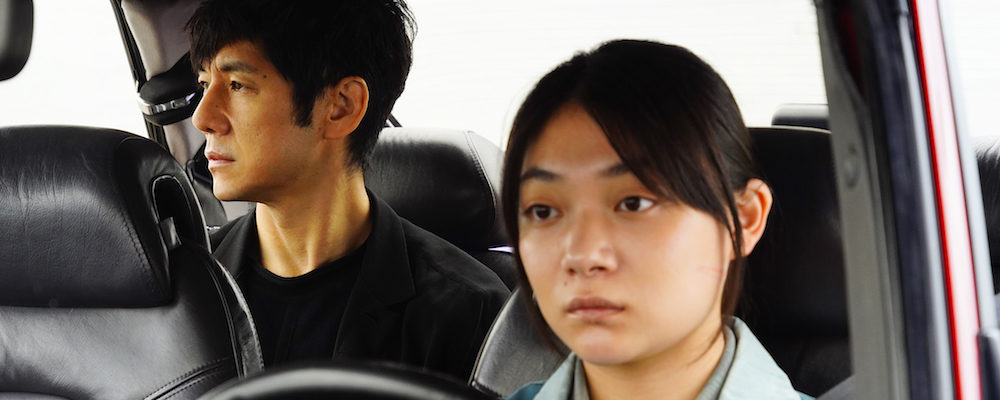Ryusuke Hamaguchi’s Masterful ‘Drive My Car’ Rides Through Rough Emotional Terrain
Tony Sokol
Ryusuke Hamaguchi’s “Drive My Car” opens with the post-lovemaking telling of a story of a teenage girl who breaks into the house of the boy she has a crush on, stealing up to his room and stopping just short of masturbating on his forbidden bed. The storyteller is a professional one, screenwriter Oto (Reika Kirishima) works on some of Japan’s most popular network shows, but the final reluctance has nothing to do with any limitations learned from TV drama. It is a choice to change gear, and find an alternate route.
Hamaguchi’s nearly three-hour film is an adaptation of Haruki Murakami’s nearly 40-page short story “Drive My Car.” There is nothing added to the story, the embellishments all come from the leisurely unfolding of emotional details, and a love for theater. The main character, Yusuke (Hidetoshi Nishijima), is a Tokyo-based theater director, and his gift is becoming one with the text of the plays he is adapting. He had done it as an actor, for many years, in films and on television, before a tragedy sent him back to the stage for solace. “Drive My Car” is an ode to acting as much as it is a subtly effective work of grief-stricken art.
The film tells of a happy marriage kept that way because of secrets no one wants to see. It is a tale of romantic revenge so passive, it is only an afterthought, and a coming-of-age story cloaked in a road-trip mismatched-buddy film. The theater director, who has a car accident in the film because of undetected glaucoma, is assigned a chauffeur, Misaki (Toko Miura), but not because of his illness. He drives his red Saab 900 to a job directing a multilingual production of Anton Chekhov’s play “Uncle Vanya” at a theater festival in Hiroshima, where an actor killed a pedestrian in an accident, and now all out-of-town artists forfeit driving rights.
Yusuke likes to run his lines while driving, playing a cassette recording of his now-dead wife reading all the parts but his. Losing driving privileges is an intrusion on his private space and creative process. The hired driver, Misaki, is 23 years old, the same age Oto and Yusuke’s daughter would be, but she died of pneumonia when she was four. This is a mere passing tone in the text of the film, alluded to only once, past the midway point, but it informs the film as a kind of retroactive foreshadowing.
This melodrama is told in a straightforward, linear fashion which allows an expectant air of intrigue and the constant threat of unexpected sorrow. After a flight is cancelled early in the film, Yusuke comes home to find his wife having sex with a young actor named Takatsuki (Masaki Okada), who had introduced himself to Yusuke after a theater performance. Yusuke’s revenge comes years later, when he casts Takatsuki in the role everyone assumed would be his: the title character Vanya, who is much older than the young actor blindsided by the part.
Misaki becomes not just a driver, but a witness to the tragedy of her fare’s life as it plays out in the backseat. She gradually becomes a confidante and offers counsel, and hears and takes confessions. Two years before he took the job in Hiroshima, Yusuke found Oto dead from a cerebral hemorrhage. When he left that morning, she mentioned wanting to speak with him. He drove around before going home, not wanting to risk that conversation. He blames himself for not getting home in time.
Nishijima is sublimely magnificent as Yusuke, internalizing his sadness so fully it is almost a physical trait. “She’d grasp a thread of a story from the edge of orgasm,” he says about Oto, with unadulterated reverence. Reika Kirishima covers a wide range of emotional space in a relatively short span of time in the film. She really carries the bulk of the humor, with very few scenes. It’s never the line, but the delivery, usually contradicting the words themselves. Oto’s presence never goes away.
Miura almost reluctantly imbues Misaki with nearly unfathomable depth, she says more with an averted glance than with any full sentence. Her guilt comes across as numbness, but the wounds are still bleeding. Misaki is mysterious, guarded, untrusting, and as vigilant an observer of human behavior as she is of vehicular turbulence and road conditions. Her mother taught her to drive when she was in middle school so she could get some sleep on the way to work, and would beat Misaki if she woke her because of some bump in the road.
Hamaguchi treats every moment delicately, allowing conversations to have their natural rhythms, pauses, and conclusions. The pace is serene. The camera is slow. There are moments when it appears we are looking at a photograph before some wind moves an object to tell us it is not still life. The camera lingers on scenes so long they become filled with suspense.
The most emotional scene in the film has no sound at all, it runs several minutes, and is filled with intense dialogue, the kind only Chekhov could write. “Chekhov is terrifying because his lines drag the real out of you,” Yusuke notes. This scene is done in Korean Sign Language. “Drive My Car” presents a very subdued tale of internal catharsis through all the modes of communication available and it resonates as cerebrally as it does viscerally. The performances are restrained, yet raw, and the psychodrama is implosive.
“Drive My Car” releases Nov. 24 in select cities.

